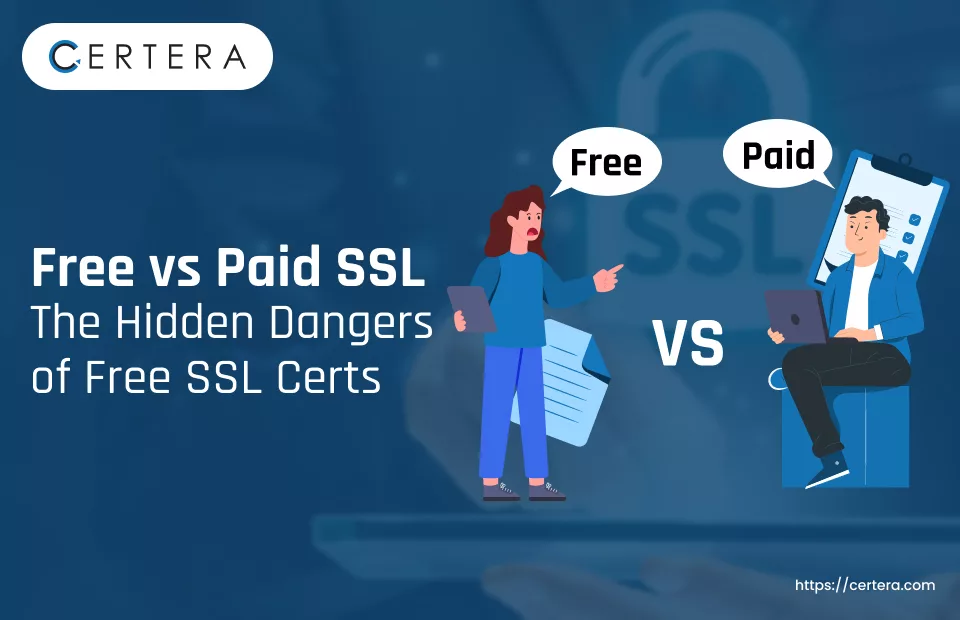Free vs. Paid SSL: The Hidden Dangers of Free SSL Certs

To ensure secure connections between users and websites, organizations prioritize using SSL certificates, as it’s pretty evident that a website secured with an SSL certificate assures visitors that it’s safe to use.
When it comes to obtaining SSL certs, there’s often a debate about whether to opt for free or paid ones. Both of these have a comparable encryption level and make HTTPS available for websites.
Now, if the purpose is justifying with free SSL Certificates, why would somebody opt for paid ones? Well, we’ll explain the reason and difference between free and paid SSL in this blog.
Let’s begin!
What is SSL/TLS Certs?
SSL (Security Sockets Layer), TSL (Transport Layer Security), or digital certificates are the foundation of a secure internet.
How?
Previously, websites used Hypertext Transfer Protocol (HTTP) to transfer data over the Internet, but this method is not secure and vulnerable to breaches. But now, things have changed, and sites use Hypertext Transfer Protocol Secure (HTTPS). It is an extension of HTTP that uses SSL or TLS encryption.
When an individual visits a website that uses HTTPS, TLS first verifies the website’s server identity and encrypts the connection to prevent hackers from stealing any data transmitted between the browser and the site.
Now, SSL certs are divided into different categories, but these are of three types, namely:
- Domain Validation: Provides the least level of security and is easy to obtain.
- Organization Validation: Compared to DV certificates, these provide an enhanced level of validation.
- Extended Validation: These certificates guarantee the highest level of trust and validation.
Key Differences Between Free and Paid SSL/TLS Certificates
Below are some of the key differences between free and paid SSL/TLS certificates.
Ease of Sourcing or Acquisition
- Free SSL certs can be obtained easily, and not only one; you can get multiple certificates within no time.
- Paid SSL certs are provided after proper issuance and installation procedure.
Security Features
- Paid SSL certificates come with enhanced security features that protect websites from potential threats.
- Free SSL certs do not have any security features.
Browser Compatibility
- Paid Certificates are compatible with almost 99.9% of browsers, including the legacy or lesser-known versions too.
- Free certificates also have good browser support, but we can’t predict if they will work on legacy browsers or lesser-known systems.
Trust Seal
- Free SSL/TLS certs do not come with a trust seal.
- On the contrary, paid SSL certs purchased from trusted CAs (certificate authority) include a trust seal that you can display on your website. This will assure the visitors that your website is completely secure to use.
Customer Service
- The companies from which you get free SSL certificates are less likely to respond to customer support requests. It can be a huge disadvantage as you can’t wait for a solution too long when it comes to the website’s security.
- If you buy an SSL certificate from Certera, you’ll get 24/7 technical support from our experienced team.
Renewal/Validity Period
- The validity of free SSL certificates typically lasts from one to three months. This means you have to manually renew the certificates, which can be troublesome, especially if you have multiple sites.
- Paid SSL certificates have a minimum validity of one year, which means less frequent certificate renewal.
Ownership
- When buying free SSL certs, always remember that you will not get control over its ownership.
- On the other hand, with paid SSL certificates, you get full ownership over the cert. This means you can install it on any server and hosting provider.
In short, the certificate is yours, and you have full control over it.
Warranty Period
- Free SSL certificates do not offer any sort of warranty, and nobody is liable to answer if any security breach happens to your website.
- Paid SSL/TLS certificate comes with a proper warranty against potential data breaches and fraudulent certificate issuance.
Validation Level
- Free SSL certs only support Domain Validation, which means they can only confirm the applicant requesting the certificate controls. Free SSl DV cert can be obtained in less than 5 minutes.
- Along with DV, paid SSL certs also offer OV and EV validation options. So, if you want OV and EV certificates, then you have to buy only paid certificates, as free ones do not offer this functionality.
Certificate Authorities offering Free SSL Certificates
Below are some of the certificate authorities that offer free SSL certs.
Let’s Encrypt
Let’s Encrypt is the most famous and recognized name when it comes to brands offering free SSL certs. It is a free, automated, and open certificate authority (CA) service offered by the Internet Security Research Group (ISRG).
SSL certificates can be obtained from their website at no cost. The best part is that renewal is also free after the certificate expires.
SSL For Free
As the name suggests, SSL For Free offers free SSL certificates within minutes. They are widely trusted and have delivered more than 3,000,000+ free certs.
Cloudflare
Last but not least, Cloudflare provides free SSL / TLS certs that can be deployed in less than 5 minutes. Some of the world’s biggest brands, like IBM and Loreal, trust Cloudflare.
Disadvantages of Free SSL Certificates
Some of the disadvantages of Free SSL certificates are explained below.
No Liability Protection
Can you imagine when your website can be hacked?
Of course, no one wants to imagine such a scenario, but let’s be practical: this can happen to anyone out there.
In fact, almost 30k websites are hacked globally on a daily basis. If you buy a free SSL certificate, your website will not be protected from such attacks. So, all we want to say is, choose wisely!
Limitations of Installing & Renewing SSL Certificates
The next disadvantage of free SSL certs is the limitation on their renewal and installation.
If you renew the SSL cert manually using the on-demand renewal feature, then you’ll be limited to 5 attempts per week for renewing a single website.
On the contrary, if you request multiple SSL certificate installations for one website, then be cautious, as you might get blocked. This limits to 50 attempts per week for one domain name.
No Customer Support
Free SSL certificate providers offer very limited customer support and do not offer the same level of financial backing as paid alternatives. Also, if your website’s SSL certs get compromised, your customers will not trust you, and they’ll choose different alternatives.
Limited Lifespan
With that being said above, free SSL certs last from only one to three months. This means you or your team will be responsible for renewing the SSL Certificate every one to three months. If, in any case, you forgot to do so, your website will be flagged as “not secure” and show your visitors the below warning.
Only Support Domain Validation
There is a saying that faster isn’t always better, and the same applies here as well.
No doubt, free SSL certificates get issued in minutes, but they only support domain validation, which is the least secure version.
If you own a website that collects customers’ personal and sensitive information, using DV certificates will put their data at risk.
Advantages of Paid SSL Certificates
Paid SSL certificates offer numerous advantages, as explained below.
Warranty Coverage
This is one of the greatest advantages of a paid SSL certificate, i.e., the liability or warranty it offers to guard your company against data breaches. This warranty can go up to $1,000,000, which is alone more than enough to justify the cost of a paid SSL cert.
Customization Options
Unlike free SSL certificates, which only support domain validation, paid SSL certificates support both organization and extended validation, which is particularly beneficial for websites that collect users’ personal data.
Easy To Scale
Whether you want to scale up your business operations or implement new security protocols, paid SSL/TLS certificates offer the scalability options needed to meet your specific requirements. Also, you can easily get new certificates, renew the previous ones, or revoke the compromised certs.
Comprehensive Support
When you invest in buying an SSL/TLS certificate, you gain access to comprehensive customer support from the respective Certificate Authority (CA). Their team of experts will help you with all your queries, from installation and configuration to troubleshooting.
Compliant with Industry Standards and Regulations
Paid SSL/TLS certificates meet industry standards and regulations, such as GDPR and PCI-DSS, to ensure your website remains compliant with relevant laws and guidelines.
Hidden Dangers that Affect your Business due to Free SSL Certificates
Here’s how free SSL certificates can affect your brand value.
- These certs don’t come with warranties or liability protection, which means they will heavily impact your organization in case of failure or fraudulent transactions. The worst part? You won’t be compensated!
- Do you want to put your customers’ trust and revenue at stake? Of course not! Right? But if you opt for free SSL certificates, then directly or indirectly, you are doing the same because these do not provide a safe and secure environment for website users.
- With only Domain Validation support, the risk of cyber-attacks is much higher.
- Free SSL certificates have shorter lifespans and require more frequent renewal.
- It lacks the necessary advanced security features and is not widely recognized by all browsers or devices.
Certificate Authorities Offering Paid SSL Certificates
Below are some of the trusted CAs (Certificate Authorities) that offer paid SSL certificates.
Certera
- Number one on our list is the modern and affordable certificate authority, Certera, which offers reputed SSL certs at prices starting at just $3.99/yr! So, why don’t you grab one? Click here.
- We offer the whole range of SSL/TLS certificates, including domain validation, organization validation, and extended validation certificates that come with 256-bit strong encryption, Free site seal, 99.9% browser compatibility and Unlimited server license.
- You can also get SSL certificates of the world’s top brands from our website, including Comodo, Sectigo, GeoTrust, and DigiCert.
- Client satisfaction is our top-most priority; that’s why we offer a 30-day money-back guarantee and 24*7 technical support to address all your queries.
Comodo
Comodo provides a variety of SSL certificates, including DV, OV, and EV SSL certificates, at the best prices.
Sectigo
They offer the best SSL certificate options to meet different business needs. Sectigo has over 700000+ customers and is trusted by Fortune 1000 companies.
GeoTrust
GeoTrust, also a DigiCert brand, offers SSL certificates with different validation levels and features, suitable for small to medium-sized businesses.
DigiCert
DigiCert is a leading CA that provides premium SSL certificates with advanced security features, including OV and EV SSL certificates, as well as wildcard and multi-domain certificates.
GlobalSign
GlobalSign offers DV, OV, and EV SSL certificates with features like SHA-2 encryption, ECC support, and strong security protocols.
The Bottom Line
No matter if you run a small, medium, or large business in any sector, the security of your website can’t be compromised in the worst-case scenario. When buying SSL certificates, “you’ll get what you pay for!”
With free SSL certs, you can save money, but the benefit will be short-term. But if you get paid SSL certs from Certera, you can enjoy lifetime benefits and peace of mind that your website is secure.
| Certificate | Price |
|---|---|
| DV SSL Certificates | Starts at Just $3.99/Yr |
| Multi-Domain (SAN) Certificates | Starts at Just $9.99/Yr |
| Wildcard SSL Certificates | Starts at Just $39.99/Yr |
| OV SSL Certificates | Starts at Just $26.99/Yr |
| EV SSL Certificates | Starts at Just $60.99/Yr |
